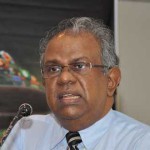A Brief Colonial History Of Ceylon(SriLanka)
Sri Lanka: One Island Two Nations
A Brief Colonial History Of Ceylon(SriLanka)
Sri Lanka: One Island Two Nations
(Full Story)
Search This Blog
Back to 500BC.
==========================
Thiranjala Weerasinghe sj.- One Island Two Nations
?????????????????????????????????????????????????Monday, June 19, 2017
Three Cheers “Again“ To The Governor Of CBSL Who Recognizes Citizens Rights
 We
are living amidst media reports that forces us to question, whether the
leaders in governance, who having taken the solemn oath to uphold the
Constitution in the discharge of their duties in, duly recognize the
rights of citizens as vested in them by the Constitution.
We
are living amidst media reports that forces us to question, whether the
leaders in governance, who having taken the solemn oath to uphold the
Constitution in the discharge of their duties in, duly recognize the
rights of citizens as vested in them by the Constitution.
In the context of constitutional provisions embedding
and defining fundamental rights of citizens, how could it be possible
that leaders in governance, purportedly as quoted in the media, had
taken public stances that;
1.
Recognition medals and awards won by sportspersons competing in their
personal capacity, but under nomination and flag of the country, cannot
be sold or otherwise disposed of at will; and where necessary to do so,
special laws will be promulgated to prevent such sales or transfers. Whether
memorabilia related to significant global / national sporting events
were also to fall in to this category of items, the sale of which is to
be prohibited is unclear ( eg. bat/ball/gloves, wickets, hat and
clothing used by a world cup wining team member). It is presumed here
that despite training facilities , costs of training, fitness and travel
having been state sponsored, there were no specific contracts that
required such persons winning medals to hand them over or to hold them in trust for the state or at the disposal of the state. It
is possible that the leader in question may have failed to get best
advice as to whether the proposed prohibition of disposal of medals
would tantamount to a violation under the constitution of the property
rights and other rights of the sportsperson.
2.
The import of some brands of pharmaceuticals, merely on the ground that
the value thereof exceeds a specified maximum import price specified
for that category of pharma product, being prohibited by gazette. Such
prohibitions could adversely affect the fundamental rights of citizens,
including right to life, if that particular drug was the only one that
the particular patient could tolerate without side effects or the only
drug must use to get the desired medical outcome post use out, as
determined by a qualified medical practitioner.
3.
A purported threat was issued by a leader to debar a person from the
practice of his profession and vocation, on the grounds that he has made
a false statement in quoting some incidents as reported in a published
source, which statement could tantamount to hate speech or a statement
made to incite violence; whereas the Constitution has provisions to
allow any citizen to practice a profession of choice, so long as it is
legal. The freedom to practice a profession can be restricted only in
terms of a code of ethics and conducts of the profession when developed
in terms of the by-laws of the profession and binding on the member.
In
the back drop of the above potentially unconstitutional stances taken
by leaders and subsequently uncorrected, the citizens saw the highly
professional and citizen’s rights conscious action coming from the new
Governor of the Central Bank and his top team as reported in the media,
following what appeared to be a citizen unfriendly action proposed by
the Central Bank and published in a news report in the media.
A media release quoting Central Bank of Sri Lanka stated that “CBSL will not make payments on mutilated, altered or defaced currency notes after 31.12.2017.”
This news item made citizens panic and wonder what would happen to
damaged notes they may acquire or posses in the future, especially where
such damage was purely accidental. As public panic set in, activists
started a review of the applicable legal rights of potentially
negatively impacted citizens.
It
is a punishable offense under the Monetary Law for “mutilation,
alteration and deface of currency notes”. Willful damage to notes or
utter disregard of expected good practices in storing, using and
transport of currency notes must be avoided by citizens as printing and
issuing of currency note with essential security is a costly exercise
for the state.


